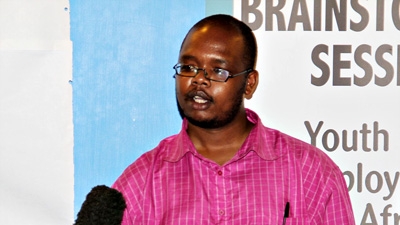WASHINGTON, June 4, 2012— African youth want to work, but they need the education, information, skills training and opportunities necessary to get a good job.
That was the consensus after four days of brainstorming sessions with youth in Ghana, Kenya and the Democratic Republic of the Congo.
“We want to engage African people, give power to African people, make change and enable people to do well,” said Marieme Jamme, co-founder of Africa Gathering and curator of the sessions.
Between April 20 and 27, 2012, more than 600 youth joined World Bank and Africa Gathering organizers to share their views on how to increase employment in Africa, and to offer solutions to some of the challenges they face.
The events were part of a larger effort by the World Bank to include youth perspectives in an upcoming report on creating productive jobs for Africa’s youth.
“The energy and creativity embodied in the more than seven million people under the age of 25 seeking work each year create an opportunity to generate tremendous economic growth in Africa,” said Deon Filmer, a lead economist in the Bank’s Africa Region, and one of the team members working on the report. “But this massive influx of youth into the job market also poses a challenge for countries trying to generate jobs and raise the productivity of their workers.”
“We need to reconnect education to work.”
In Accra, participants expressed concern that they are not being taught marketable skills in school, and suggested the government revise its educational policies to align with workforce demands.
“Our education is not career-oriented,” said one participant.
One participant suggested that development institutions should require countries to develop youth employment programs before they become eligible for loans and grants.
Participants also agreed that simply graduating from school does not guarantee a job.
“I am more determined to encourage my friends to think outside the box,” said Setsofia, a Ghanaian teenager. “Our senior high school curriculum focuses on what is intelligence … it’s about how you can make your theories practical.”
In addition to revamping the educational system to better equip graduates with the knowledge and skills needed to compete in the workforce, participants also expressed their desire for access to more information about available jobs and support in making career choices. Some of their ideas included mentorship programs, as well as counseling and career guidance centers to help students, business owners and graduates.
“If we want the youth of Ghana to be employed, we need more career advisory centers or hubs across universities and in the country in general,” said Andrew Renner, also from Ghana.
“The problem is in the middle class.”
In Nairobi, participants said that access to education has created a youth culture that is focused on becoming doctors, lawyers or going after a limited number of white collar jobs in industries such as advertising, tourism and finance.
“There are too many looking for the higher-class jobs and nobody who wants to do work,” said Mary, who didn’t believe that there are enough middle-class jobs for the number of youth who need them.
“Is there enough room?” she asked.
According to participants, the middle class mentality has created a generation of young people who are not qualified for blue collar jobs such as those in the agricultural field. Although all 122 participants acknowledged their grandparents were farmers, less than 20 percent of them currently work in the farming business.
There is also a lack of information on how to get into the farming industry and virtually no farming success stories to make agriculture an attractive employment option to young people, they said.
“We think of agriculture as hot sun, but it isn’t,” said one participant.
Many also expressed their concern that the lack of interest in agriculture extends further than just employment.
“If we don’t grow the agriculture base, we won’t be able to feed the new populations,” one participant said.
“We know 35-year-old people who have no professional experience.”
Providing job training for young people and increasing access to employment information was the focus of the two-day brainstorming session in the Democratic Republic of the Congo’s capital Kinshasa. Participants also called on the government to create a youth employment strategy to attack both issues.
“If there is no policy in Kinshasa, there is no use,” said Stepahene.
According to a representative of the Youth Employment Network, a youth employment advocacy organization, there are currently 200 YEN offices spread over 11 provinces in the DRC. But young people aren’t aware of the work they do, the representative told participants.
This is proof that there is an information problem, said one participant, Asaphe. “A single platform for consultation is not at all sufficient,” he said. “We must therefore have several advisory groups.”
Nick Nsewa, who attended the gathering in Kinshasa, suggested that universities and governments work together to provide proper education and training, and to create more jobs for graduates.
Although some discussions included criticism of the World Bank, the respective governments and their policies, participants appreciated and welcomed the opportunity to share their thoughts.
“We are a new Africa,” one Ghanaian participant said. “We are smart people. We will not see a continent that is accurate unless we play a role in it.”
This conversation continues on Faceboook, Twitter, and on the Jobs4Africa wiki.


